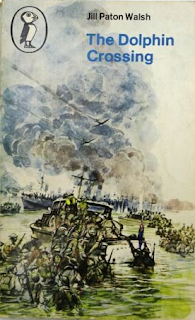I picked up Jill Paton Walsh's The Dolphin Crossing months ago secondhand, purely because it was by Jill Paton Walsh -- I didn't even look at the cover or take in the subject matter, but quite by chance I have ended up reading it as part of a string of war-time (or 1950s) books set on the coast of Kent, and this one, like Our Castle by the Sea, also features the Dunkirk evacuation of 1940.
However, the treatment of the event in The Dolphin Crossing differs hugely from Lucy Strange's version. Published in 1970, it was informed by the memories of actual survivors, and the vivid, graphic, detailed descriptions of the evacuation, the wounded, the merciless sea, the experience of being under fire, are light years from the sanitised, second hand account that Petra hears in Our Castle.
The explosion stunned John...'Pat!' he called. 'Pat, where are you?''Here,' said a voice at his feet. Pat had been knocked over by the blast. He scrambled up again, and they looked for the little cruiser. There was not the smallest trace of her. Pat was looking at John in alarm. And John realised that there was a nasty, hot, wet feeling in his left arm. He looked down at it, and saw that he was pouring with blood. He felt weak and faint.
But almost better than the gripping evacuation sequence is the first part of the book, where posh John, sent home from boarding school, gets to know working class Pat, evacuated into the country with his pregnant stepmother, and trying to live in an old railway carriage. The two boys fix up an old stables for Pat and 'the old girl,' and their developing friendship, the misunderstandings of class and temperament that they manage to overcome, are a real delight. And yet again, Romney Marsh features as the boys and their boatload of evacuees wash up on the shore nearby.
The Dolphin Crossing seems to have been reissued a number of times, and I'm glad, because this slender book is a really terrific, gritty read that stands up well beside contemporary accounts, and definitely benefits from being informed by first person accounts from the time.















Such a vivid and haunting book! I remembered it from my own childhood reading;then bought it again a few years ago for my son who doesn't like reading but loved the film Dunkirk. The ending really struck me as a child; I still find it unsettling thinking about it all these years later. JPW didn't pull her punches even for child readers, Fireweed also has an ending that leaves unanswered questions in the reader's mind.
ReplyDeleteI thought it was fantastic, Ann. Definitely an honest and unflinching story, it feels REAL in a way that no other Dunkirk book I've read does. JPW is such a great writer, she achieves so much in so few pages. I think this one will haunt me too.
ReplyDelete